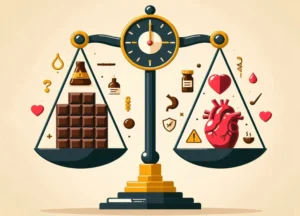Dark Chocolate for Weight Loss: Tips, Benefits, and Precautions

Dark chocolate has long been a favorite food, but did you know it can also be a powerful weight-loss tool? Incorporating dark chocolate for weight loss into your diet can help curb cravings, boost metabolism, and improve overall health. Rich in antioxidants, flavonoids, and essential nutrients, dark chocolate offers more than a satisfying treat—it supports your weight-conscious goals.
Unlike milk chocolate, which is high in sugar and low in cocoa, dark chocolate is high in cocoa, resulting in several health benefits, including weight management. Studies show that consuming dark chocolate for weight loss can reduce cravings for sweet, salty, and fatty foods, making it easier to control your appetite. By understanding how to incorporate dark chocolate into your diet, you can enjoy its rich flavor while helping you on your weight loss journey.
Why dark chocolate is good for weight loss
Dark chocolate is more than just a delicious treat—it’s a functional food that can aid in weight loss.
- One of the key reasons dark chocolate is good for weight loss is its high antioxidant content, particularly flavonoids. These compounds help reduce inflammation, improve blood flow, and enhance metabolism, contributing to weight management.
- Moreover, dark chocolate has been shown to help control appetite by promoting feelings of fullness and satisfaction. Studies suggest that the bitter taste of dark chocolate helps reduce cravings for sweet, salty, and fatty foods, making it easier to stick to a healthy eating plan.
- The presence of healthy fats in dark chocolate also slows digestion, helping you feel fuller for longer, which can prevent overeating.
- Finally, the magnesium and iron found in dark chocolate can boost energy levels, improve mood, keep you motivated, and be consistent with your weight loss efforts.
By including dark chocolate in your diet, you can enjoy a satisfying treat while supporting your weight loss goals.
Choosing the Best Dark Chocolate for Weight Loss
Which Dark Chocolate is Best for Weight Loss?
The cacao content is the most crucial factor when selecting dark chocolate for weight loss. Opt for dark chocolate that contains at least 70% cacao or higher. This ensures more beneficial compounds like antioxidants and flavonoids, aiding weight loss while keeping sugar content low. Research has shown that higher cacao content is associated with improved metabolism and reduced cravings.
In addition to cacao content, pay attention to the sugar and additive content. The best dark chocolates for weight loss are those with minimal sugar and no unnecessary additives. Avoid chocolates that contain added oils, artificial flavors, or excessive amounts of sugar, as these can counteract the health benefits and potentially hinder your weight loss progress. Organic options are also worth considering, as they are free from harmful pesticides and chemicals, providing a cleaner, healthier choice.
Which Dark Chocolate is Healthiest?
The healthiest dark chocolates have a short ingredient list, focusing on high cacao content and minimal additives. Look for products that contain just cacao, cocoa butter, and a small amount of sugar. Fairtrade and organic certifications are indicators of high-quality chocolate, ensuring that the cacao beans are ethically sourced and free from harmful substances.
Some recommended brands known for producing high-quality, health-conscious dark chocolate include Lindt, Green & Black, and Alter Eco. These brands prioritize high cacao content and often offer organic and fair trade options. When reading labels, always check the cacao percentage and ingredient list to ensure the healthiest option that aligns with your weight loss goals.
When and How to Eat Dark Chocolate for Weight Loss

Best Time to Eat Dark Chocolate for Weight Loss
Timing plays a significant role in maximizing the benefits of dark chocolate for weight loss. Consuming dark chocolate in the morning can give you an early boost of antioxidants and flavonoids, setting a positive tone for the day and helping to curb cravings before they start. Consuming dark chocolate in the afternoon can help you stay energized and control your midday hunger. While evening consumption might satisfy post-dinner cravings, reducing the temptation to indulge in less healthy snacks.
The timing of dark chocolate consumption can also influence your metabolism. Research suggests that consuming dark chocolate in the morning may speed up metabolism and help control blood sugar levels throughout the day, which are beneficial for weight loss. However, consuming it too late at night might interfere with sleep due to its caffeine content, so avoiding late-night excess is best.
Can I Eat Dark Chocolate on an Empty Stomach?
Eating dark chocolate on an empty stomach has its pros and cons. On the positive side, consuming dark chocolate before a meal may help reduce appetite, making you feel fuller and less likely to overeat. This can be particularly helpful if you’re trying to manage your calorie intake. However, for some people, eating dark chocolate on an empty stomach can cause digestive discomfort or even a slight spike in blood sugar levels, especially if consumed in large quantities.
Eating dark chocolate on an empty stomach is safe but you should pay attention to how your body responds. If you experience discomfort, enjoying dark chocolate as a balanced meal or snack is better.
How Much Dark Chocolate is Good for Weight Loss?
When it comes to portion control, moderation is key. The recommended daily intake of dark chocolate for weight loss is about 1 to 1.5 ounces (30-45 grams). This amount provides the benefits of antioxidants and healthy fats without contributing too many calories to your diet. It’s important to enjoy dark chocolate mindfully, savoring the flavor while keeping portions in check.
Balancing enjoyment with moderation is crucial. Even though dark chocolate is a healthy food choice, consuming too much might result in excess calories, which may impede your efforts to lose weight. By sticking to the recommended portion and combining it with a well-rounded diet, you can enjoy dark chocolate as a satisfying and beneficial treat.
Incorporating Dark Chocolate into Your Diet
How to Eat Dark Chocolate for Weight Loss
Incorporating dark chocolate into your diet for weight loss can be enjoyable and effective when done strategically. One practical tip is to use dark chocolate as a healthy snack between meals. Instead of reaching for sugary or processed snacks, enjoy a small piece of dark chocolate to satisfy your sweet tooth while benefiting from its appetite-suppressing properties.
Pairing dark chocolate with other healthy foods can enhance its weight loss benefits. For example, you can combine dark chocolate with nuts like almonds or walnuts rich in healthy fats and protein, to create a satisfying and nutrient-dense snack. Another idea is to melt dark chocolate and drizzle it over fresh fruit, such as strawberries or bananas, for a delicious and antioxidant-packed treat.
Creative consumption ideas can also help you integrate dark chocolate into your diet without overindulging. You might add small pieces of dark chocolate to your morning oatmeal or yogurt for indulgence that still fits within your calorie goals. By enjoying dark chocolate in these ways, you can maintain balance and moderation while enjoying its rich flavor.
How to Make Dark Chocolate at Home for Weight Loss
Making your dark chocolate is easy and healthy to ensure you’re eating a product with only the best ingredients and no unnecessary additives. A basic recipe includes 3 ingredients: cacao powder, coconut oil, and a natural sweetener like honey or maple syrup. These ingredients are mixed and melted, then poured into molds or a lined baking dish to set in the refrigerator.
The benefits of homemade dark chocolate are numerous. You have complete control over the ingredients, allowing you to choose organic, high-quality cacao and adjust the sweetness to your liking. This can help reduce the overall sugar content, making your homemade chocolate even better for weight loss. Additionally, you can experiment by adding healthy extras like nuts, seeds, or a sprinkle of sea salt to boost chocolate’s nutritional value and flavor.
Also read: The best way to eat Flaxseeds for weight loss.
Homemade dark chocolate supports your weight loss goals and offers a satisfying way to indulge in a treat you feel good about. Making it yourself ensures that every bite is delicious and aligned with your health objectives.
Health Considerations and Precautions

Who Should Not Eat Dark Chocolate?
While dark chocolate offers numerous health benefits, it may not suit everyone. Individuals with certain health conditions should exercise caution or avoid dark chocolate altogether. For instance, those with acid reflux or GERD may find that dark chocolate triggers symptoms like heartburn due to its caffeine and theobromine content. Additionally, people with caffeine sensitivity or anxiety disorders might experience jitteriness or increased anxiety when consuming dark chocolate.
Dark chocolate may also interact with certain medications. For example, it can interfere with the effectiveness of certain antidepressants, particularly MAO inhibitors, or amplify the effects of stimulants, leading to increased heart rate or blood pressure. Those with dietary restrictions, such as individuals following a low-oxalate diet to prevent kidney stones, should also limit their intake of dark chocolate due to its oxalate content.
Is it OK to Eat Dark Chocolate Every Day?
Eating dark chocolate daily can be part of a healthy diet but in moderation. Balancing the pros and cons is the key. Daily consumption of dark chocolate can provide consistent antioxidant intake, support heart health, and help manage cravings for less healthy snacks. However, it’s essential to be mindful of portion sizes to avoid consuming too many calories or excessive amounts of sugar.
A suggested frequency for regular dark chocolate intake is 1 to 1.5 ounces (30-45 grams) daily. This amount allows you to enjoy the health benefits without risking overconsumption. While daily consumption is generally safe, it’s important to listen to your body and adjust your intake if you notice any negative effects.
What Happens if You Overeat Dark Chocolate?
Overindulging in dark chocolate can cause several negative effects. The most immediate concern is weight gain, as even high-quality dark chocolate is calorie-dense. Consuming large amounts can quickly add up in calories, potentially undermining your weight loss efforts. Also, too much dark chocolate can cause digestive issues like bloating, gas, or constipation, particularly if you’re sensitive to the high-fat content.
To avoid overindulgence, practice mindful eating. Savor small portions of dark chocolate, and pair it with other healthy foods like nuts or fruits to help you feel full and satisfied with less. Setting limits on how much dark chocolate you keep at home can also help prevent overeating.
Side Effects of Dark Chocolate
While dark chocolate is generally well-tolerated, it can have some side effects, especially when consumed in large amounts. The caffeine content in dark chocolate can lead to restlessness, insomnia, or increased heart rate in sensitive individuals. If you’re prone to digestive issues, the high fat content in dark chocolate might cause discomfort or exacerbate conditions like IBS.
Managing or avoiding these side effects involves moderation and timing. If you’re sensitive to caffeine, avoid consuming dark chocolate in the afternoon or evening to prevent sleep disturbances. To minimize digestive issues, stick to small portions and consider pairing dark chocolate with fiber-rich foods to aid digestion. By being mindful of these potential side effects, you can continue to enjoy dark chocolate as part of a healthy, balanced diet.
When to Avoid Dark Chocolate
There are some situations and times when it is best to avoid dark chocolate. The most common time to avoid dark chocolate is right before bedtime. Due to its caffeine and theobromine content, consuming dark chocolate late in the evening can lead to difficulty falling asleep or poor sleep quality, especially for those sensitive to stimulants.
Also read: How much sleep do I need to reduce weight?
Another situation where dark chocolate may not be advisable is during stress or anxiety. The stimulants in dark chocolate can exacerbate feelings of anxiety or nervousness, so it’s best to limit consumption if you’re feeling particularly stressed. Additionally, if you’re dealing with digestive issues like acid reflux, IBS, or other gastrointestinal concerns, it’s wise to avoid dark chocolate as it can potentially worsen these conditions.
Can You Eat Dark Chocolate with Certain Health Issues?
For individuals with specific health issues, consuming dark chocolate requires careful consideration. For those with diabetes, dark chocolate with a high cacao content (70% or higher) and low sugar may be acceptable in small amounts, as it has a lower glycemic index than milk chocolate. However, portion control is crucial, and it’s best to consult with a healthcare provider to ensure it fits within your dietary plan.
People with heart conditions can also benefit from dark chocolate, as its flavonoids support heart health by improving blood flow and reducing inflammation. However, moderation is essential to avoid excessive calorie intake, which could lead to weight gain and negate these benefits.
Those on special diets, such as low-oxalate or low-FODMAP, should be cautious with dark chocolate. The oxalates in dark chocolate can contribute to kidney stone formation, so it’s important to limit intake if you’re prone to kidney stones. Similarly, those on a low-FODMAP diet for IBS may find that dark chocolate triggers symptoms and should consume it sparingly.
In all cases, it’s important to consult with a healthcare provider before incorporating dark chocolate into your diet if you have any underlying health conditions. This ensures that it’s safe and appropriate for your individual health needs.
Conclusion
Adding dark chocolate to your diet can be a delicious and beneficial way to meet your weight loss goals. When chosen and consumed wisely, dark chocolate offers a rich source of antioxidants, flavonoids, and other nutrients that help curb cravings, boost metabolism, and boost overall health.
By choosing high-quality dark chocolate with a cocoa content of 70% or higher, practicing moderation, and timing your consumption appropriately, you can enjoy this treat without compromising your weight loss efforts.
However, it is important to consider your health needs and consult a healthcare provider if you have concerns about how dark chocolate fits into your diet. By doing so, you can confidently enjoy dark chocolate as part of a balanced and mindful approach to weight management.
FAQs
1. Can Dark Chocolate Help You Lose Weight?
Yes, dark chocolate can help with weight loss when consumed in moderation as part of a balanced diet. Its high cocoa content provides antioxidants and flavonoids that help curb cravings, improve metabolism, and support overall health and your weight loss journey.
2. How can I know I’m buying good quality dark chocolate?
Good quality dark chocolate usually has a cocoa content of 70% or more and a short list of ingredients, like cocoa, cocoa butter, and a small amount of sugar. Avoid chocolate with added oils, artificial flavors, or excessive sugar, and look for certifications like organic or fair trade for extra reassurance.
3. Are there any healthy ways to satisfy chocolate cravings without consuming too many calories?
Yes, you can pair a small piece of dark chocolate with a nutritious food such as nuts or fresh fruit. It satisfies your cravings, provides additional nutrients, and helps you feel fuller for longer, making you less likely to overeat.
4. What should I do if I overeat dark chocolate?
If you eat a lot of dark chocolate, don’t overdo it. Focus on getting back on track with balanced meals and portion control. Drinking water and being physically active can also help you feel better and prevent weight gain.
5. Can dark chocolate fit into a vegan or dairy-free diet?
Many dark chocolates are naturally vegan and dairy-free as they usually only contain cocoa, cocoa butter, and sugar. However, if you are on a strict vegan or dairy-free diet always check the label to ensure no dairy products are included.
6. Is it true that dark chocolate can improve mood?
Yes, dark chocolate contains compounds like serotonin and endorphins which positively affect mood and reduce stress. However, it must be enjoyed in moderation to avoid possible negative effects of excessive consumption.






